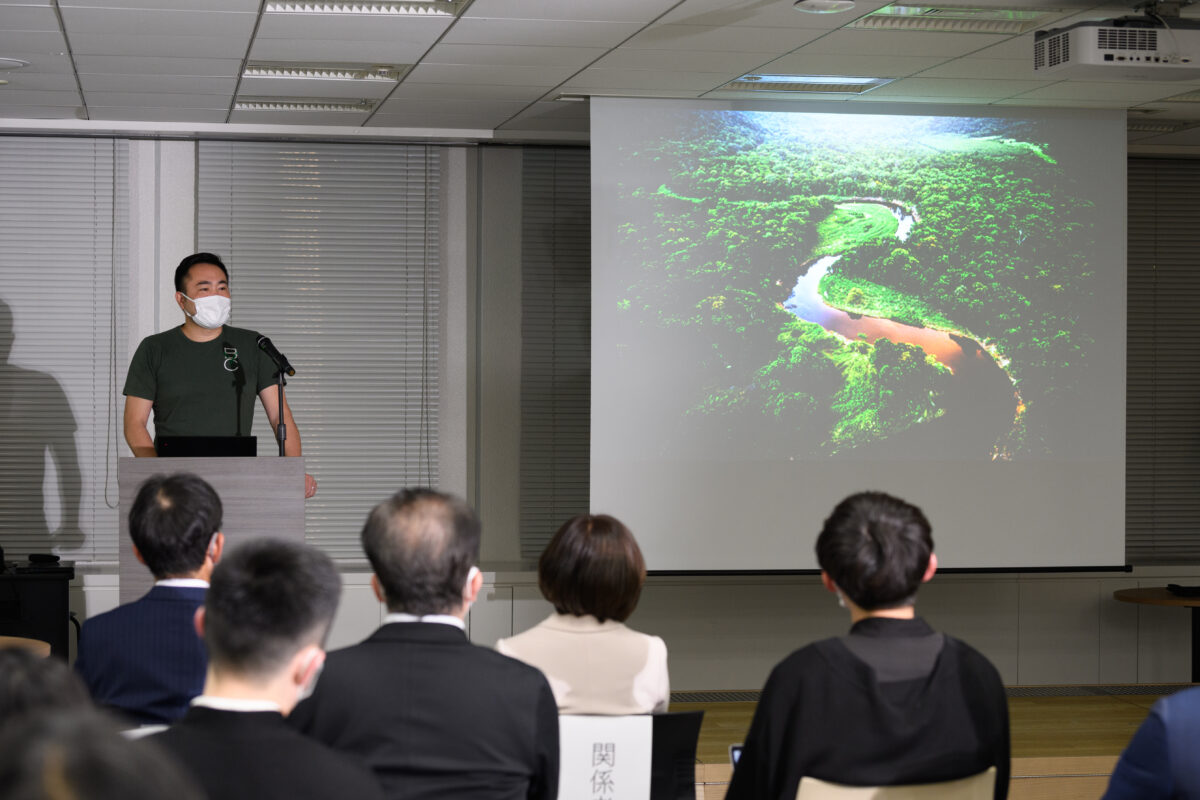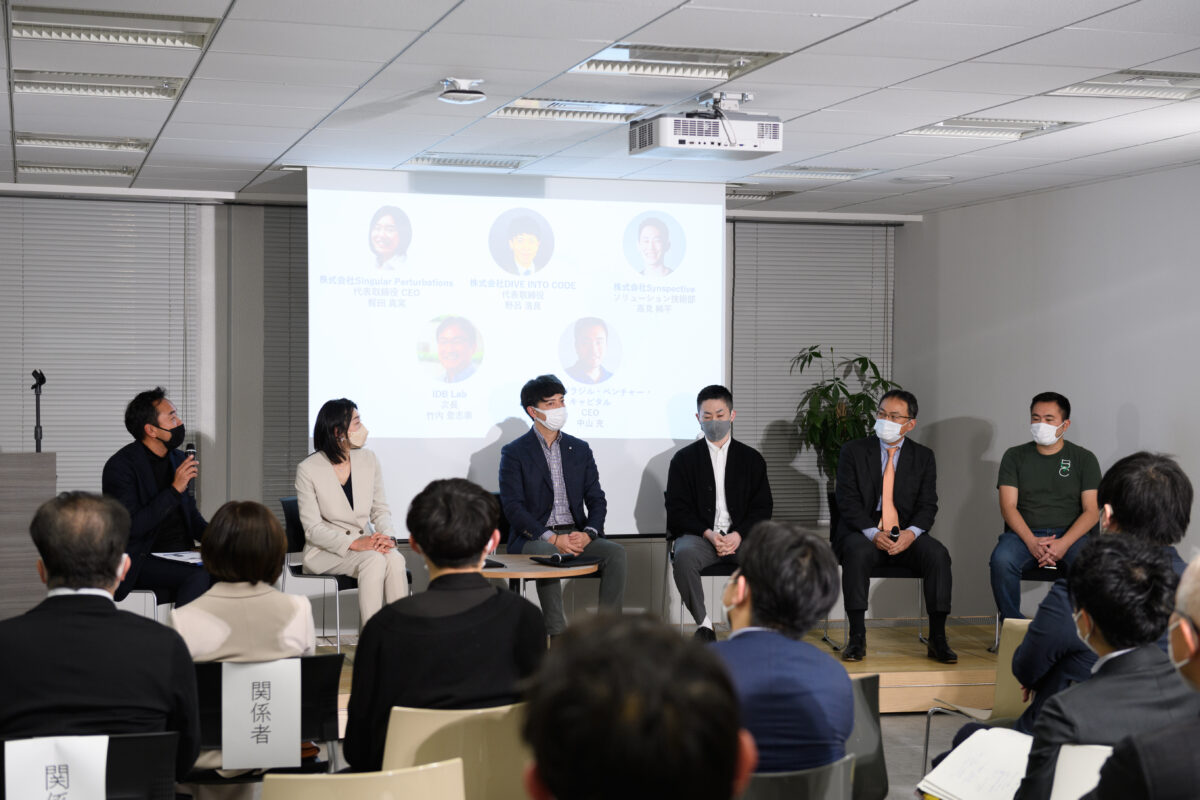Latin America and the Caribbean is attracting attention as a destination for companies expanding overseas.
With the recent push to solve global issues and achieve the SDGs, the act of companies expanding their business overseas is growing in significance. So to which regions do such companies expand? In recent years, Asia and Africa are often mentioned as destinations in this respect, while the number of companies entering the Latin America and Caribbean market, on the other hand, remains small. However, this is a region faced with numerous development issues, while additionally offering an attractive environment for companies to do business. Recently launched under these circumstances is TSUBASA, an open innovation program that aims to contribute to the achievement of SDGs in Latin America and the Caribbean by Japanese start-ups.

The streets of São Paulo, lined with skyscrapers. Economic growth in the Latin American region has been remarkable in recent years.
The challenges and possibilities of the region that gave birth to “the world’s largest digital bank”
The Latin America and Caribbean region is an area facing a variety of development issues. Economic disparity is representative of this, with low bank account ownership and a large number of people with unsatisfactory access to financial services.
Because of the seriousness of the situation, there is a high potential for companies that approach these issues to achieve great results. Nubank, a FinTech company founded in Brazil in 2013, offers services that enable individuals with low income to easily open bank accounts and enjoy financial services. With an IPO totaling 5 trillion yen in 2021, it is now referred to as “the world’s largest digital bank”.
Access to food is another issue that should not be overlooked. Given that this is an area where continued population growth is expected, it can be surmised that the global food and protein crisis reported on in recent years will come to affect the region. Posed as one of the solutions to such development issues, agribusiness is experiencing growth. From Japan as well, both funding and companies specializing in smart farming and drones used for spraying pesticide are finding their way into the market.
On the other hand, the fact that the Latin America and Caribbean region has proven to be an “attractive market” for these companies to do business does not appear to be particularly well known.
“The total nominal GDP of the region is about 1.5 times that of ASEAN, and its internet infrastructure is well-developed. Also when looking at the number of Netflix subscribers per country in the world, you will find Brazil in second place. And in terms of startup investments, the Latin America and Caribbean region as a whole has seen a threefold increase between 2020 and 2021.”

The above words were spoken by Mitsuru Nakayama of B Venture Capital, an investor in and incubator of start-ups in Latin America and the Caribbean. According to him, the region also offers other advantages from a business perspective, such as the ease of travel due to the countries being connected by land, and the common languages of Spanish and Portuguese spoken across the region. The religion and culture are predominantly Roman Catholic, and there is little need to change one’s approach from country to country. This is why it is “an attractive region for Japanese start-ups to develop their businesses,” he went on to explain.
Mr. Nakayama made these suggestions at the kick-off event of “Open Innovation Challenge TSUBASA” on December 19, 2022.
TSUBASA is a program in which the Japan International Cooperation Agency (JICA) and IDB Lab, the innovation laboratory of the Inter-American Development Bank (IDB) Group, collaborate to support Japanese start-ups in developing their business ideas in the Latin America and the Caribbean market. This will be the second time the program is held, following the 2021 edition.
The kick-off event marked the start of this year’s program, and at the beginning of the event, JICA Senior Vice President Katsura Miyazaki explained the significance of the initiative.
“The awareness of the Latin America and the Caribbean region among Japanese companies cannot be described as high. This is perhaps due to its distance from Japan as well as a lack of information available on the region. TSUBASA provides business development support by leveraging the networks of JICA and IDB Lab, and aims to contribute to the solving of increasingly complex development issues and the achievement of SDGs together with Japanese start-ups.”
In addition, Hideharu Tanaka, Director of IDB’s office in Asia, expressed the following thoughts based on the results of the previous year.
“The technologies of Japanese start-ups can help solve development issues in Latin America and the Caribbean, and TSUBASA strongly supports those start-ups willing to take on the challenge. The word TSUBASA has now taken root as a result of the previous year’s efforts. Whether it will go on to become an established word, like “sushi” and “wagyu”, depends on the success of this year’s edition. We look forward to seeing companies brimming with potential take part in large numbers.”
The workings of TSUBASA. If a company passes the selection process, they go on to take part in a six-month support program.
TSUBASA is divided into two phases. In Phase 1, the “Open Innovation Challenge,” companies are invited to submit ideas that contribute to the solving of development issues and the achievement of SDGs in the region. Companies that make it through the selection process go on to participate in Phase 2, the “Support Program,” where they spend six months preparing for commercialization in the region.
During the course of the program, the start-ups receive support in various aspects of the process. Examples of the provided support includes “mentoring,” in which business advice is provided by experts on the region and in venture investment, the “introductions to local networks,” including local partners and pilots for the initial stages of a project, and “assistance with travel expenses and interpretation”.
In addition, depending on the nature and progress of a project, the program may lead participants to gain access to the business support tools of IDB Lab and other programs offered by JICA, as well as to local funding. In other words, further support may be available even after the conclusion of the program.
Last year, 23 companies applied out of which 8 were selected. These selected companies proceeded to participate in the support program. Furthermore, six of the eight companies then went on to apply for access to IDB Lab’s support tools after the end of the program.
Representatives from three of the companies selected last year spoke at the kick-off event. They each talked about the circumstances of their application.

Singular Perturbations, a developer of crime prediction systems and other services, applied focusing in on the issue of security and crime prevention in Latin America and the Caribbean. DIVE INTO CODE, which is developing a remote vocational training business to prepare young people for jobs in programming, began operations in Rwanda, Africa, about five years earlier, and assumed that the Latin America and Caribbean region would also be in urgent need of solutions aimed at developing human resources in IT. Another reason why the company considered expanding there was the existence of large Japanese communities in the region.
Synspective, which develops satellites and provides satellite-based solutions, originally put their satellites to use in analyzing land subsidence in Guatemala, where they came to realize the large need for such business solutions in the region. That was how they decided to apply to TSUBASA.
How did DIVE INTO CODE identify the potential in Paraguay? Advice received during mentoring was a deciding factor.
We will now look back and re-examine what kind of support each company received during TSUBASA’s support program. For example, DIVE INTO CODE is currently preparing a remote vocational training business for programmers in Paraguay, and the reason why Paraguay was chosen as the target country was due to the mentoring of experts on the area. After the event, the Representative Director of the company, Hiroyoshi Noro, had the following to say.

iroyoshi Noro, Representative Director of DIVE INTO CODE Corp.
“During mentoring, we learned that Paraguay lacks digital talent and that the government is providing free training to 100,000 people in the country. In light of these circumstances, it was suggested to us that we develop our business in Paraguay.”
It would be difficult to learn about these kinds of circumstances of Latin American and Caribbean countries only through activities in Japan. In the TSUBASA program, the business model and target areas are determined through regular discussions with JICA, IDB Lab, and other experts in a consultative style.
“Learning that Paraguay has a large Japanese community and that Japanese people and Japanese companies are deeply accepted in Paraguayan society was also a big influence. So, when we first tried to develop a business aimed at the Japanese community of Paraguay, the local JICA office helped connect us with a key person who could bring the community together. This person was also willing to meet with us because we were introduced to them by JICA.” (Mr. Noro)
Quick access to these kinds of key people is another important form of support offered by the program. “If we had tried to do it ourselves, it would probably have taken us six months to find our key person,” Mr. Noro went on to explain.
The company is already working with a local NGO to start a demonstration of their remote vocational training business for programmers in Paraguay in 2023. Access to IDB Lab’s support tools has already been approved through an application via the partnering NGO.
“I think some companies may be hesitant to apply because of the distance from Japan and due to a lack of information about the area. There was a lot I didn’t know either. Still, if the business idea or vision of your company applies to the issues faced in this region in any way, I think it’s a challenge worth taking on. The risks involved can be adequately controlled through the support, so if anything, I think it’s important to step into this market sooner rather than later” (Mr. Noro)
Other companies were also the recipients of JICA and IDB Lab’s generous support. To Singular Perturbations, for example, they suggested that the company develop their crime prevention business in Uruguay, and that they should also consider B2B and B2C models. The reason behind this suggestion was that IDB Lab was supporting another start-up in the country dealing with security solutions for women, which lead to the notion that great value could be created through collaboration between the two start-ups. Singular Perturbations is now working together with this startup and they already have plans to start a demonstration test of a service that notifies users of areas with a high potential for crime.
In the case of Synspective, the company initially considered developing a B2G business, but in light of the situation in Latin America, they were advised that quicker access the market could be achieved by simultaneously developing a B2B business. IDB Lab has invested in more than 50 venture capital firms (VCs) currently operating in the region, and through interviews with VCs involved in mining development that may be interested in the services offered by Synspective it was confirmed that there also exists a significant demand for B2B solutions.
And so the TSUBASA program now enters its second edition. At the end of the kick-off event, Manabu Ohara, Director General of JICA’s Latin America and the Caribbean Department, emphatically expressed the following wish:
“We hope to receive applications from companies ready to become the wings of change and solve problems through their innovative business practices.” (“Tsubasa” is a Japanese word meaning “wing”.)
Applications for Open Innovation Challenge TSUBASA began on January 5 and will continue through to February 3. The selection process will then take place in February, and the six-month support program is scheduled to begin in March.
We encourage any companies with a desire to put their business solutions to use and contribute to the solving of development issues in Latin America and the Caribbean to consider applying.

